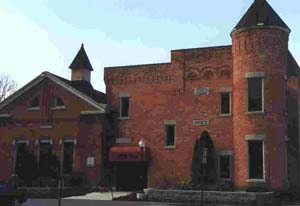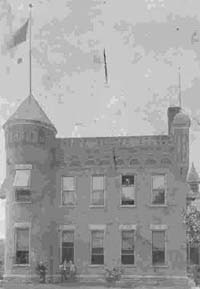
For anyone with strong Batavia roots, the Engine House conjures up dining memories of corned beef sandwiches for $2.10 and a champagne Sunday brunch for less than six bucks. Now the longstanding historical icon earmarked as a capital project has some much higher dollar figures attached.
The county Legislature is expected to vote soon on the $1.86 million project, to be offset by a $892,610 grant and sales tax proceeds of $975,990. Since the funding was from 2022, it’s considered a 2022 capital project.
County Manager Matt Landers laid out the explanation during Wednesday’s Ways & Means meeting.
“And the reasoning behind this is that we're running out of space. We have run out of space with public defenders. So that's why there's already four over there in the engine house. And we're putting two more over there,” Landers said. “This is utilizing outside funding, outside of the county, to be able to put an elevator into the building. That is in our long-term plans now, based out of necessity, because the courts facility was not built large enough. It's an access issue to be able to access that building properly.”
The courts facility — a complex built for city, county, and family court, children’s services, the district attorney and various other legal professionals — is now unable to accommodate all county personnel.
Landers credited Public Defender Jerry Ader for securing the grant of nearly $893,000. Part of the expense includes an amount not to exceed $150,600 for the renovation design for SWBR of Rochester.
Plans include an elevator, since it has been difficult to reach the upper floors of the building, Landers said. As it is, the public and county employees cannot access the space, he said. Legislator Marianne Clattenburg believed it was there for a reason.
“It’s a historic space, and it’s not going anywhere,” she said. “So, we might as well use it, right?”
The design may not be completed until 2024, Landers, said, and there will be flexibility in the plan.
“As soon as we have the design done and a full cost estimate out there, if it is on target like we thought it would be, then we would increase the budget, increase the project for the vendor space and then award the contracts for doing the construction work,” he said. “If it comes in too high, then we simply would pull back our funding and reallocate that sales tax into our reserve and for future purposes. This really is a building that's underutilized now … And the best part of this is it's right next door to the courthouse, right where their work is, and we have the ownership of that, and we should make good use of it.”
This isn't the first time the county has mulled the use of the Engine House. In 2017, there were discussions of giving it up or opting to renovate the site to accommodate a growing number of public defenders and make the second-floor handicap accessible. Those discussions got as far as setting a public hearing, which was canceled in lieu of tabling any definite action.
According to former county Historian Susan Conklin, the site at 3 West Main St., Batavia, had been built in the late 1800s — first as a sawmill, and later as a two-room brick shelter that housed water pumps. City leaders decided in 1948 to convert the building into a fire station, giving it the name that has stuck for the next several decades — even when purchased in the 1980s to operate as a restaurant.
The Engine House bar and restaurant closed in 1991, and it took eight years before Buildings and Grounds began to convert it into a county department. In July of 1998, the History Department was relocated into the front section of the property.


Top Photo of a more recent version of the brick Engine House, and above, former buildings, including one that was partially collapsed from an explosion. Photos from the county's History Department archives.
